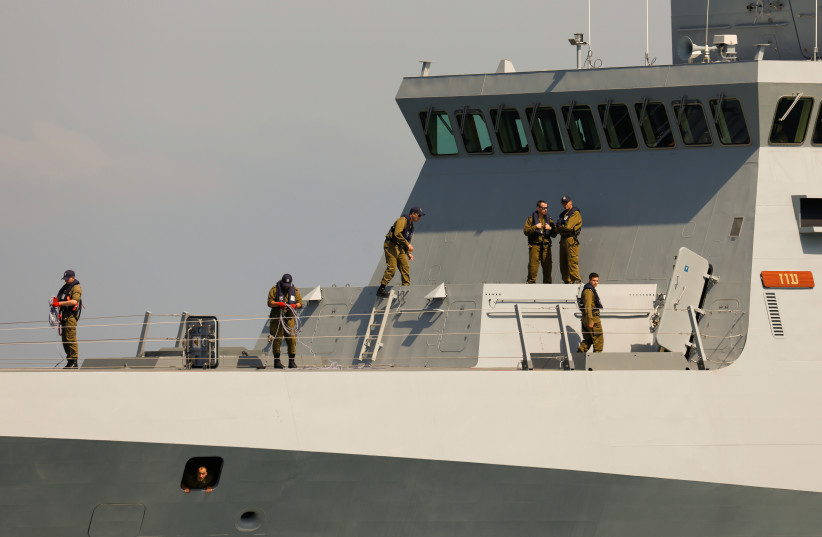Cutting-edge Saar 6 vessels used in first attack on Gaza
Cutting-edge Saar 6 vessels have been used to attack Gaza for the first time during the current war with Hamas, the IDF revealed on Monday.
Attacks from the Oz and Magan Saar 6 ships struck Hamas infrastructure for assembling weapons as well as positions and lookout posts for the Hamas naval commandos.
The naval vessels have 18 different advanced technological and precision combat systems onboard, much of which was developed in Israel, and three of them have become fully operational over the last six months.
For the last two years, the Saar 6 vessels have undergone extensive operational tests to have arrived at this moment.
In April, Israel announced that the Saar 6 missile boat’s highly advanced radar systems were used successfully in March 2021 to help track an Iranian attack drone and to facilitate assigning a specific F-35 aircraft to shoot down the incoming drone.

Defense against Lebanon and Hezbollah
Although the incident had been announced even earlier, April was the first time that it was revealed that the method for having identified and tracked the attack drone was via an Israeli naval vessel.
Until then, many had theorized that either land-based or aerial-based Israeli radar had caught the Iranian attack drone, especially since an F-35 aircraft had shot it down.
However, the announcement made it clear that the F-35 aircraft only did so after being assigned to do so through intelligence provided by the US Navy.
This revelation came along with other revelations regarding Israeli missile boats, including that they and other Israeli naval vessels – as well as US naval vessels – were involved for two weeks in mid-2022 to prepare for setting up the critical new Karish natural gas field.
Previously, it had been reported that on July 2, 2022, an IDF plane and gunboat intercepted three hostile drones launched from Lebanon towards the airspace over Israel’s economic waters.
Hezbollah claimed responsibility and its affiliates claimed that launching the drones was justified, called it “successful” and asserted it helped Lebanon in the negotiations being carried out to delineate its naval border.
Yet, later, fuller details came forward about the navy’s role, the two weeks of operations, and the specific assistance of the US Navy with intelligence and threat issues at the Karish setup stage.
In late March, the Israeli navy and five other countries completed a multi-week international joint drill with the Sa’ar 6 playing a prominent role, Naval Squadron 32 Cdr. Steven Gordon told the Jerusalem Post at the time.
“We led this international drill for three weeks, including Greece, Cyprus, Italy, the US and France. This was one of the bigger drills. We went all over the Mediterranean Sea and along the various coast points of Israel,” said Gordon.
The naval commander said that the exercise involved a mix of above-the-surface naval vessels, submarines, and aircraft.
Gordon also called the drill historic because it was the first time that the relatively new Sa’ar 6 vessel participated in an international drill, though it had participated in internal Israeli drills since being delivered to Israel over two years ago.
The 90-meter-long 2,000-ton Sa’ar 6 ship has a maximum speed of 24 knots with a range of 2,500 nautical miles. Though not much longer than its naval predecessor, the Sa’ar 5, they have been built to better handle rough seas and stay at sea longer.
“The drill included practicing maneuvers and operations against submarines, other above-surface vessels, aircraft, maneuvers to protect strategic assets, and inspections of suspicious ships,” said Gordon.
The reference to suspicious ships would usually refer to efforts to smuggle weapons or carry out terror operations by groups from Gaza, but could also relate to Iranian smuggling attempts throughout the region.
Gordon did not want to reveal specific scenarios, but it appeared pretty clear that the reference to strategic assets included defending Israel’s natural gas platforms.
For example, the naval commander discussed with the Post the July 2022 incident in which the IDF shot down the three unmanned aerial vehicles launched by Hezbollah toward Israel’s economic waters over the Mediterranean Sea.
One of the three UAVs was shot down by an F-16, but two others were downed by the naval Barak 8 medium-range surface-to-air missile system, which is also installed on the Sa’ar 6, marking the first time the system was used against aerial threats.
The Barak-8 MR-SAM system is able to shoot down enemy aircraft at a range of 50-70 kilometers (32-43 miles). It is designed to defend naval vessels against a myriad of short- to long-range airborne threats, such as incoming missiles, planes, and drones at both low and high altitudes.
Gordon confirmed that his naval vessels trained “to defend against drone attacks,” while noting that the Barak 8 defense system is only one of various defense options against drones.
The Sa’ar 6 also comes equipped with two Naval Dome missile interceptors for rockets (the maritime version of the land-based Iron Dome.
In addition to interception missile defense systems, the ships also have 16 anti-ship missiles, one 76mm Oto Melara Super Rapid main gun, two Typhoon 25mm remote weapon stations and two 324mm torpedo launchers for MK54 Lightweight Torpedoes. Each state-of-the-art ship will also be outfitted with cyber and electronic warfare systems.





Comments are closed.